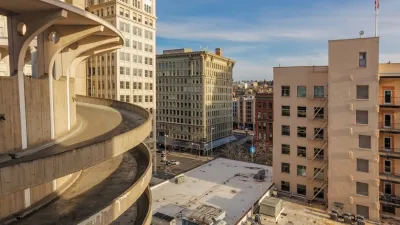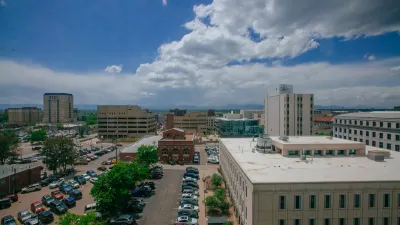A new study found that half of the city’s commercial parking spaces are usually empty.

A study showing that Boulder, Colorado has almost twice as many parking spots as are needed at any given time is prompting city officials to consider eliminating minimum parking requirements, writes John Herrick for Boulder Reporting Lab.
“At retail locations, nearly half of the parking spots go unused during peak times on average. Similarly, more than half of the spaces at office locations remain empty on average.” That number falls in residential areas to 30 percent, Herrick notes, while 35 percent of trips in the city are made in single-occupancy vehicles.
This overabundance of parking is driving up housing costs, increasing the city’s temperature and making streets more dangerous for cyclists and pedestrians by encouraging more cars on the road, according to transportation reform advocates.
Boulder planners say getting rid of parking minimums across the city would reduce the cost of housing and allow developers to build parking as needed. City officials are also considering a “transportation demand management” ordinance that would require developers to include more infrastructure for non-auto modes in their projects and offer perks to residents such as transit passes and secure bike parking areas.
FULL STORY: Boulder planners explore elimination of parking minimums across entire city starting next year

Planetizen Federal Action Tracker
A weekly monitor of how Trump’s orders and actions are impacting planners and planning in America.

Map: Where Senate Republicans Want to Sell Your Public Lands
For public land advocates, the Senate Republicans’ proposal to sell millions of acres of public land in the West is “the biggest fight of their careers.”

Restaurant Patios Were a Pandemic Win — Why Were They so Hard to Keep?
Social distancing requirements and changes in travel patterns prompted cities to pilot new uses for street and sidewalk space. Then it got complicated.

Platform Pilsner: Vancouver Transit Agency Releases... a Beer?
TransLink will receive a portion of every sale of the four-pack.

Toronto Weighs Cheaper Transit, Parking Hikes for Major Events
Special event rates would take effect during large festivals, sports games and concerts to ‘discourage driving, manage congestion and free up space for transit.”

Berlin to Consider Car-Free Zone Larger Than Manhattan
The area bound by the 22-mile Ringbahn would still allow 12 uses of a private automobile per year per person, and several other exemptions.
Urban Design for Planners 1: Software Tools
This six-course series explores essential urban design concepts using open source software and equips planners with the tools they need to participate fully in the urban design process.
Planning for Universal Design
Learn the tools for implementing Universal Design in planning regulations.
Heyer Gruel & Associates PA
JM Goldson LLC
Custer County Colorado
City of Camden Redevelopment Agency
City of Astoria
Transportation Research & Education Center (TREC) at Portland State University
Camden Redevelopment Agency
City of Claremont
Municipality of Princeton (NJ)





























